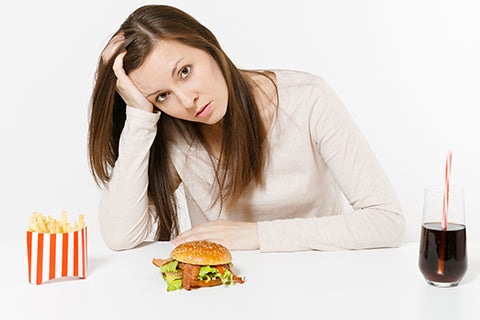
Stress May Be As Unhealthy As Junk Food

Y
ou deny yourself the fries. You say no to soda. You’re counting macronutrients like a pro. But, if your mind is racing, your sleep is fragmented, and your cortisol levels are perpetually high—is your “clean” lifestyle really clean?
Here’s the ugly truth: Chronic stress can undermine your body as much as junk food. It causes inflammation in your gut, messes with hormones, stimulates cravings, and even shuts down your metabolism. What’s worse is that, unlike a cheat meal, stress doesn’t come with a label.
In this blog, we invite you to explore:
• How the body responds to stress and how it mimics the effects of ultra-processed food.
• Why your salad isn't going to save you if the rest of your nervous system is in overdrive.
• The science behind cortisol, inflammation, and emotional eating.
• Actionable ways to "clean up" your mental diet without guilt or green juice.
Also Read: How To Improve Stamina Without Stress?
Stress vs Junk Food: A Surprising Comparison
We're trained to view processed foods with fear, and for good reason. They correlate with inflammation, insulin resistance, and a poor gut. But what if stress results in the same biological turmoil? Let's look at it:
Effect on Body |
Junk Food |
Chronic Stress |
Gut Inflammation |
✅ |
✅ |
Blood Sugar Spikes |
✅ |
✅ |
Hormonal Imbalance |
✅ |
✅ |
Cravings & Overeating |
✅ |
✅ |
Poor Sleep Quality |
✅ |
✅ |
Sluggish Metabolism |
✅ |
✅ |
Stress does not just "feel bad"; it also acts badly. Stress hijacks your body's systems in ways that closely parallel ultra-processed foods.
Also Read: Stress Causes Weight Gain – Know How?
The Cortisol Connection: Why Stress Feeds Cravings?

When you are stressed, your body releases cortisol, a hormone to help you survive a life-threatening situation. In the modern world, it is not a lion you are afraid of, it is a deadline, traffic, or the weight of emotion. When cortisol levels are high, these are the consequences:
• Increased appetite (especially for sugars and fats)
• Disrupted insulin sensitivity
• Suppressed ability to digest and absorb nutrients
• Poor sleep cycles and lack of recovery
So, yes, your salad may have been organic, but if you eat it while doomscrolling or racing to meetings, your body may not even absorb the nutrients properly.
Also Read: Symptoms Of High Stress Levels
Mental Hygiene Might Be the Next Nutrition
Clean eating is powerful. Clean thinking is just as important. Here is how to start "cleaning up" your mental diet:
1. Schedule breaks for your nervous system
Micro-moments of calm - whether that be deep breathing, gentle stretches, or a quick walk where you don’t touch your phone - can reset your stress responses.
2. Eat mindfully
Don’t just eat clean - eat slow. Chew. Breathe. Allow your body to feel and register a sense of safety before it begins digestion.
3. Draw boundaries
Saying “no” is a form of nourishment. Treat your energy like your gut, it must be protected.
4. Track stress like the way you track calories
Whether you might use journals, apps or even our quick quiz below, keep awareness of your stress load.
Complete the “60-Second Stress Load Check-In”

Your body keeps track of stress—even if you don’t. For each statement below, give yourself:
• 1 point if the statement is true most days of the week
• 0 points if the statement is rarely true
Let’s get started:
1. I wake up feeling tired even after a full night’s sleep.
2. I crave more sugar, caffeine or salty snacks than usual
3. I check my phone within 5 minutes of waking up.
4. My mind totally feels “always on” even when I try to/kind of relax.
5. I feel irritated or overwhelmed by small things.
6. I sometimes have difficulty falling asleep or wake up during the night.
7. I feel obligated to say "yes" to things even when I am at my limit.
8. I rarely take at least 10+ minutes a day to unplug or breathe.
9. I vent, more than I self-reflect; I will talk about stress but not take some action.
10. I feel disconnected from my body (tense shoulders, shallow breath, tight jaw)
Your score:

• 0–3 points: 🟢 Low stress load. Your mental health is in don’t worry about it state—probably keep doing what you are doing to benefit it.
• 4–6 points: 🟡 Moderate stress load. It’s time to tune in and recalibrate some of the more reactive stress responses before you stack on the symptoms.
• 7–10 points: 🔴 High stress load. Your body may be in survival mode. Let’s talk recovery and not resilience.
Stress is not just a mindset; it is a metabolic threat. So, before you look for the option of yet another adaptogen supplement, ask yourself: Is my nervous system nourished?
Because overall wellness is more than the food you eat. It's about how you live, breathe and feel…
Also Read: Foods That Help Reduce Stress
 Follow our Instagram page for the latest updates: badalkhudko
Follow our Instagram page for the latest updates: badalkhudko




Leave a comment